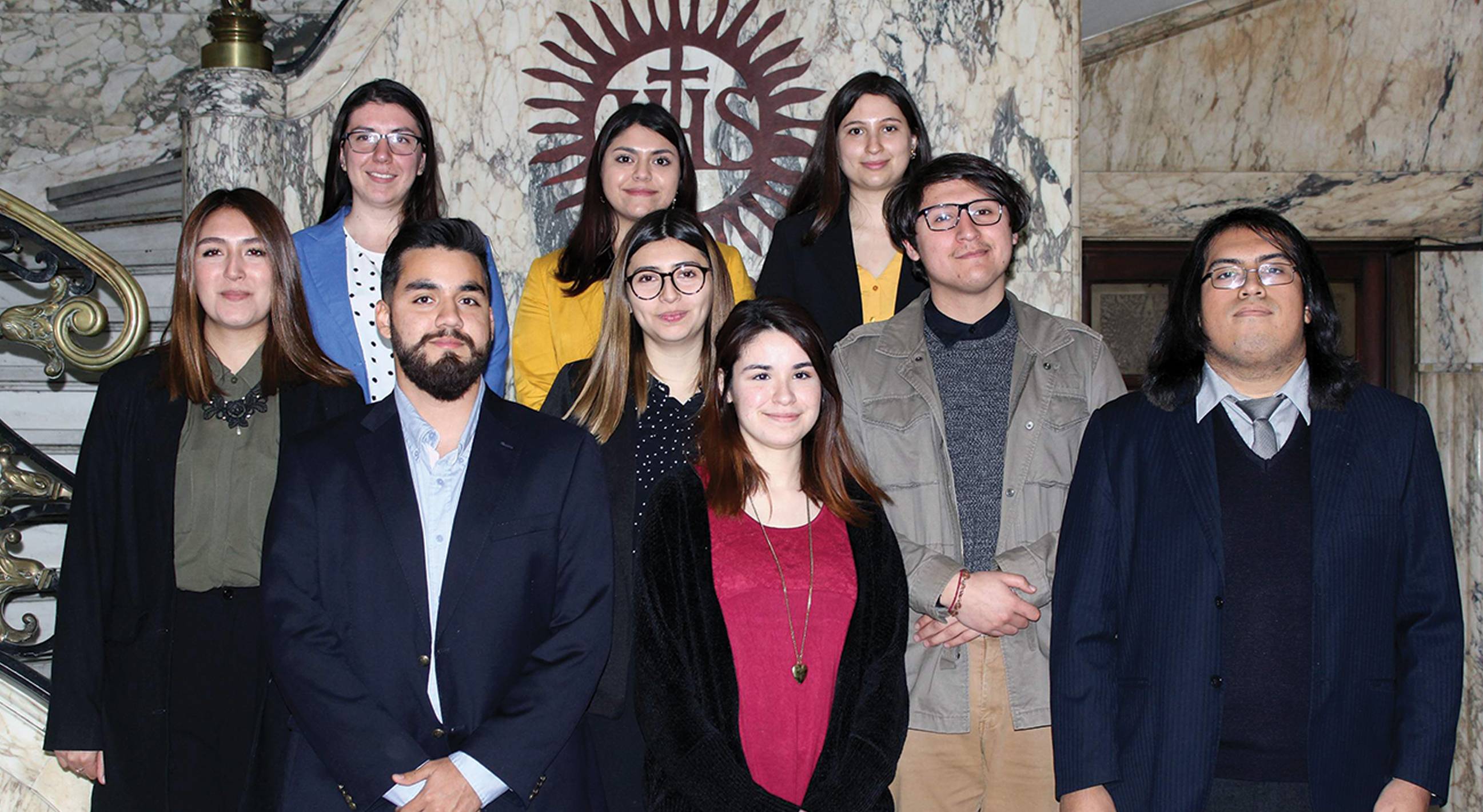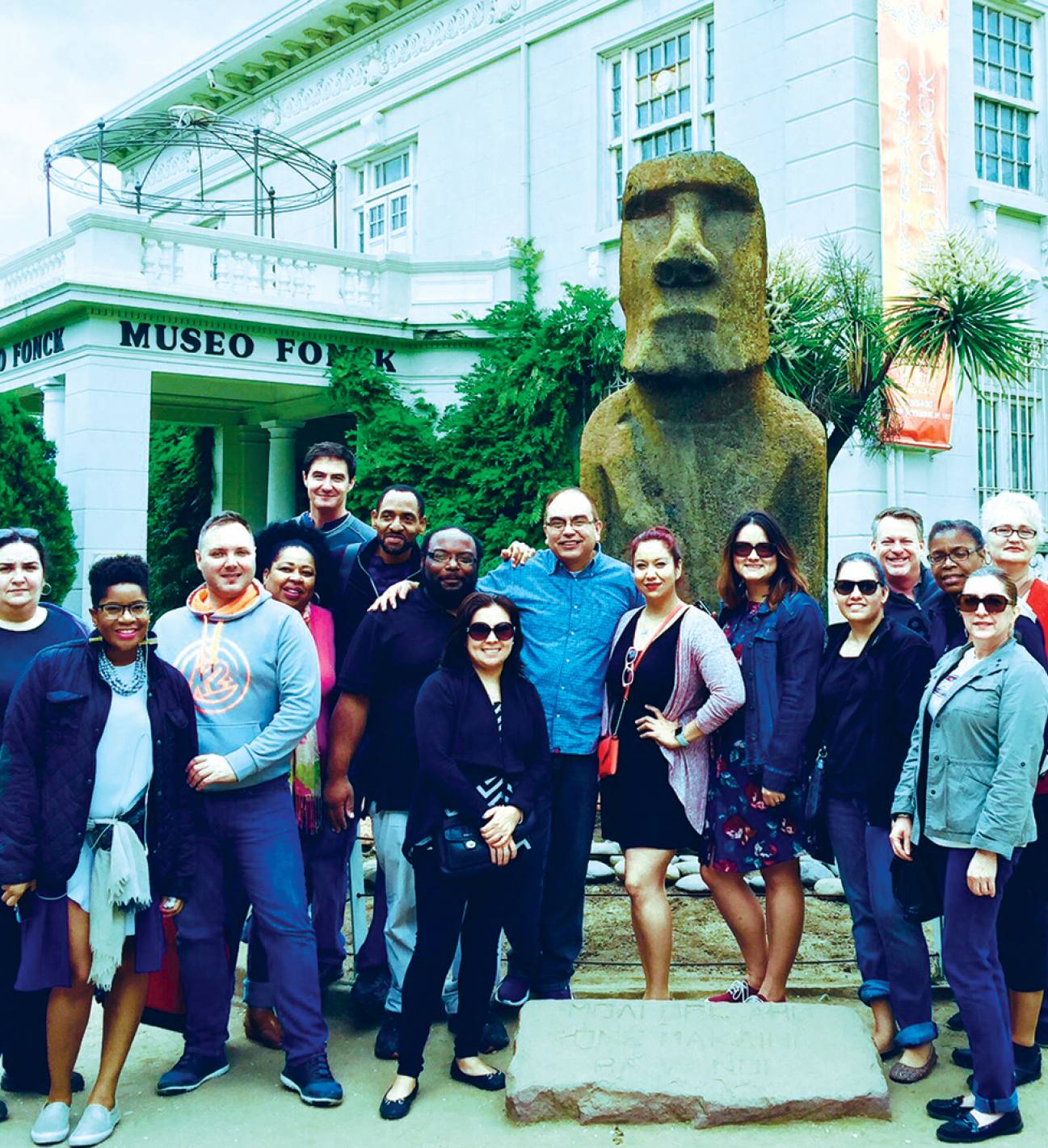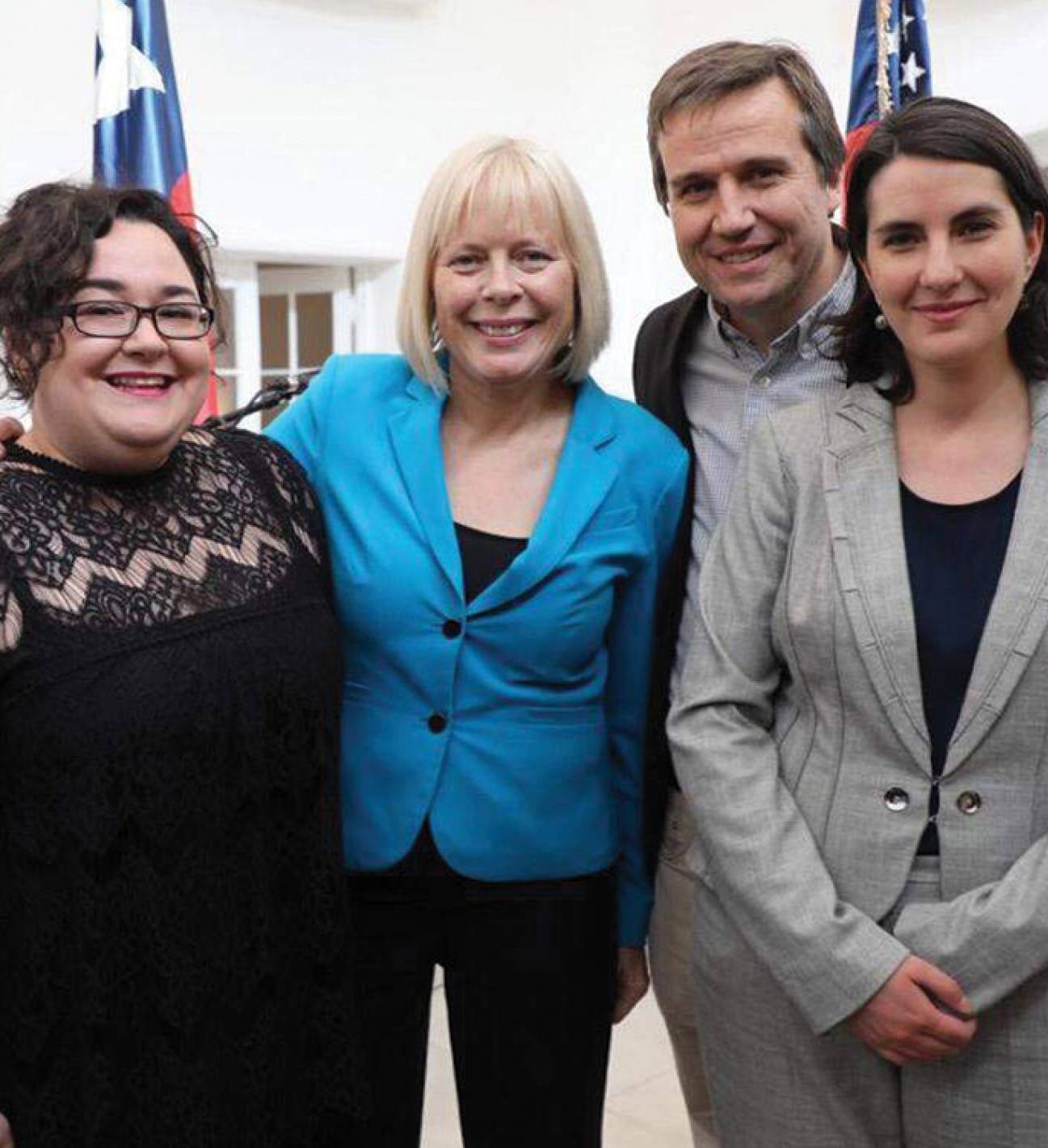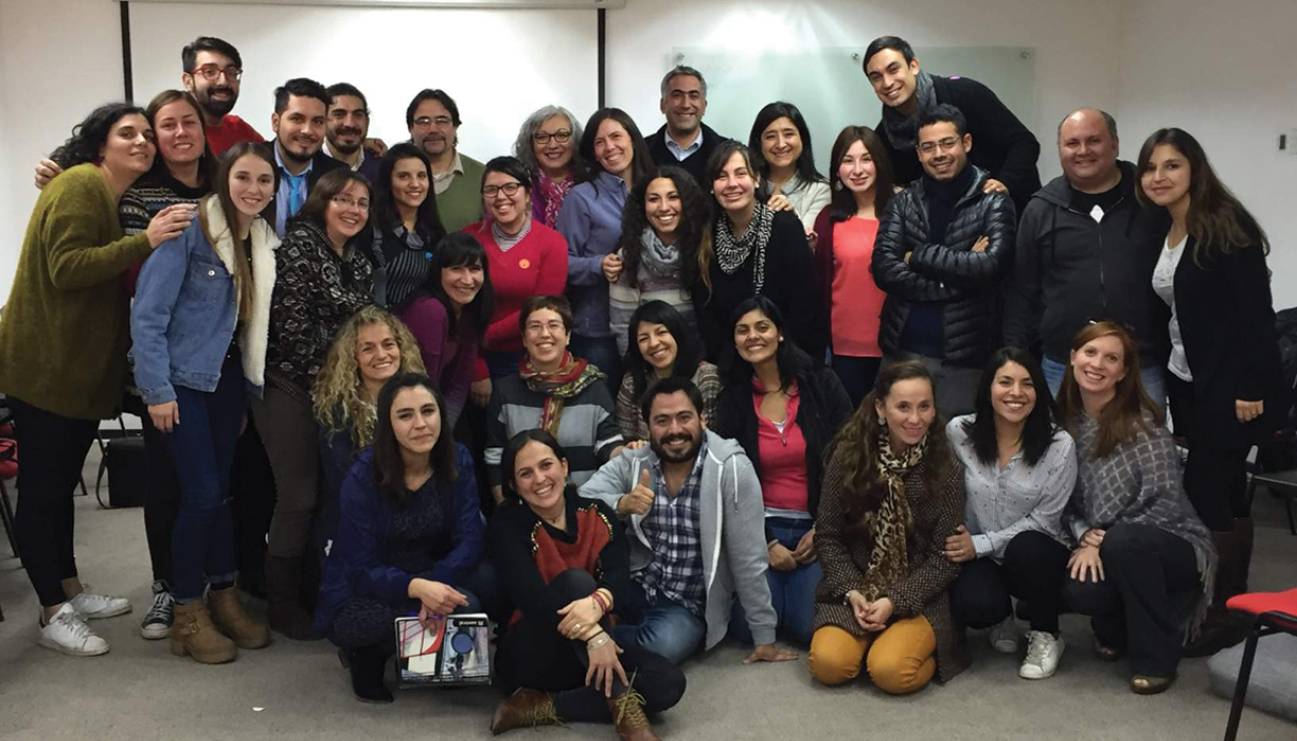
Over the past decade, the College of Education has had 43 graduate students in Chile, exchanged seven U.S. and 14 Chilean education faculty, received nine Chilean undergraduate students, and partnered with six Chilean universities, six nonprofit organizations, and numerous K-12 schools.
By Steph Spector
For nearly a decade, Bobcats in the College of Education have been trekking 4,722 miles south of San Marcos to conduct their research beyond the classroom, in the narrow and mountainous country of Chile.
Since 2012, the College of Education at Texas State University has been partnering with Chilean institutions, educators, and students to build an interconnected transnational academic exchange. That exchange has been facilitated by Dr. Michael O’Malley, dean of the College of Education. In 2005, he became a visiting professor at Universidad Alberto Hurtado (UAH) in Santiago, Chile. In August 2012, O’Malley returned to Chile as a Fulbright U.S. Scholar. There, he conducted research and lectures on issues of educational equality and leadership at UAH.
The military dictatorship in Chile ended in 1990, but 10 years later high school and university students were taking to the streets and forming social movements to advocate for a more equitable and inclusive educational system as a key component of the nation’s restored democracy. Building upon their existing relationship with UAH, Texas State began connecting doctoral students in school improvement and adult, professional, and community education to study public pedagogies in an international and Latin American context and to learn from the Chilean educational movements.
In November 2012, eight education doctoral students flew to the capital city of Santiago as part of a research partnership with a recently reimagined public library that focused on educational and social equality. In visiting K-12 schools, they explored ways that educational institutions and social movements could educate and transform societies.
Dr. Patricia Rocha, director of the Office of Educator Preparation, was a student on that project. Rocha says that even though her research experiences in Chile were short term, she returned to Texas transformed. “Seeing what their society valued and understanding they needed to protect that was empowering,” she says. Today, Rocha is dedicated to finding more opportunities for education students at Texas State, both in Texas and in Latin America.

By 2015, the connection between Texas State and Chile had grown stronger. The college initially received a $25,000 grant to initiate Project LEARN-Chile, through which 18 doctoral students would complete a semester-long course with an international component in Santiago. Throughout the course and in Chile, the students split into four groups, each collaborating with one of four Chilean community partners on research activities: Centro Gabriela Mistral (a visual and performing arts center), Fundación Iguales (a national LGBTQIA+ rights organization), a group of three K-12 schools, and representatives of the national student movement for educational equality.
Project LEARN-Chile was funded by 100,000 Strong in the Americas, a public-private partnership that aims to move 100,000 university students every year through short-term academic exchanges between the U.S. and the rest of the Americas. Short exchanges remove obstacles to international study for students without extensive economic resources, as well as for graduate students such as Rocha who may not be able to leave their families or academic and professional responsibilities for a semester-long study abroad. Rocha also participated as a doctoral student in Project LEARN-Chile, working closely with the K-12 schools.
In fall 2017, Amy Biedermann — a third-generation Bobcat — was awarded a doctoral research assistantship in the Adult, Professional, and Community Education doctoral program. As part of her assistantship, she took on the role of coordinating the university’s programs in Chile. “My goal was to learn more about internationalization in higher ed,” says Biedermann. “I was also really interested in exploring the diversity within Latin America.”

In her second year of doctoral study, Biedermann immersed herself in a five-month study abroad in Santiago. As a representative of Texas State, Biedermann nurtured the university’s partnerships with UAH and other Chilean universities. She also completed a pilot study for her dissertation on Educación No Sexista (“non-sexist education”), a feminist, gender-inclusive social movement in Chile against sexism and harassment in schools and universities. “Many university campuses were shut down by protesters for periods of multiple weeks,” says Biedermann. “I’m investigating how one of our partner universities addressed students’ demands. I’m interested in exploring this process of student social activism and what was achieved on the university administration’s side.”
Biedermann continues to collaborate with Chilean educators. In January 2020, she spent one week at an international seminar at the invitation of a professor from Pontificia Universidad Católica de Chile in Santiago. Biedermann will return to Santiago to conduct her dissertation research. She will collaborate with Chilean women to understand the dynamics, processes, and impact of the Educación No Sexista movement.
Texas State and its Chilean partners continue to learn from one another — and the web of connections is growing. Last year, nine Chilean undergraduate students from UAH spent two weeks at Texas State, funded by 100,000 Strong in the Americas. Their visit was led by Dr. Minda Morren López, Dr. Jesse Gainer, and Dr. Kiyomi Sánchez-Suzuki Colegrove. The undergraduates, who are preparing to become English teachers, had the opportunity to explore pedagogies of social transformation on campus, in K-12 schools in Hays County and Austin, and at places like the Blanton Museum of Art, the Austin Central Library, and a poetry reading at Austin’s BookWoman. “I was really amazed by the students’ commitment to their vocation and the sense of calling they have to be teachers and agents of change,” says Colegrove. The College of Education hopes to deepen the roots of the transnational exchange in the future by developing a study abroad program for Texas State’s undergraduate teacher education students.

Several faculty members have been active leaders in contributing to the Texas State-Chile collaboration. Colegrove is one of three professors who currently have research projects in Chile. She is interested in the voices and views of Latinx immigrant parents and their involvement and participation in education. Colegrove has had projects in the Chilean port city of Valpara.so and with Universidad Católica del Norte, headquartered in the Atacama Desert region.
Dr. Lori Assaf and O’Malley also have active research projects in Chile. Their interests lie in how Chilean educators view and practice writing instruction in schools, and how southern Chilean school leaders are implementing a new educational law. The research has extended to partnerships in the country’s south-central lakes district and the Magallanes Region, the southernmost Chilean region before Antarctica.
The blossoming exchange between Texas State and this Andean country has created a global classroom without walls, an opportunity for U.S. and Chilean educational researchers to engage in a consistent conversation about what it means to create fair and embracive educational communities and systems in the contemporary world. It has proved, too, that travel can provide transformative educational opportunities for everyone — no matter the subject of study. ✪